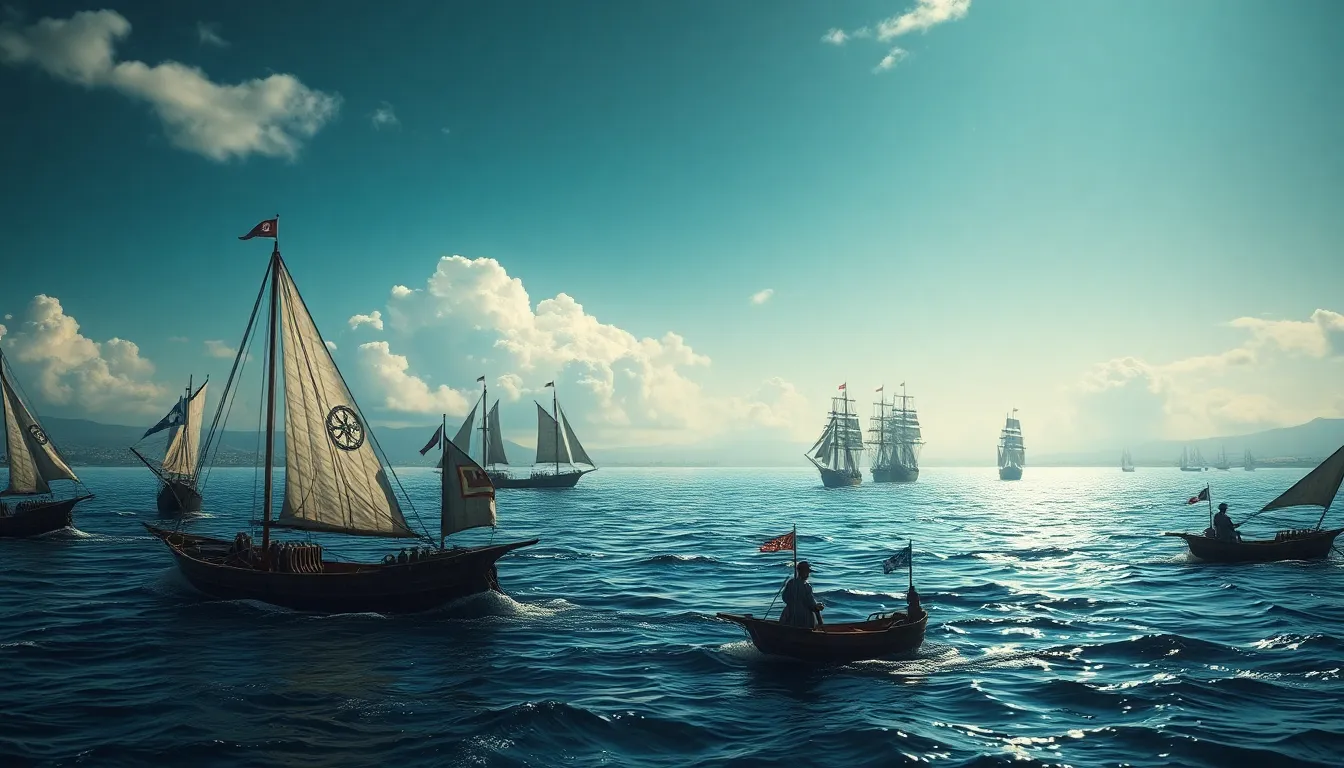The Legacy of the Battle of Salamis: Myths of Naval Strategy
I. Introduction
The Battle of Salamis, fought in 480 BC, is one of the most significant naval engagements in ancient history. This battle marked a pivotal moment in the Greco-Persian Wars, where the Greek city-states united against the expansive Persian Empire. The importance of this battle transcends its immediate military outcome; it established new paradigms in naval warfare and strategy that would influence future generations.
This article aims to explore the myths surrounding the Battle of Salamis and its strategic legacy. By examining the historical context, the battle itself, and the subsequent interpretations, we can gain a clearer understanding of how this monumental clash shaped naval strategies in the ancient world and beyond.
II. Historical Context of the Battle of Salamis
The Greco-Persian Wars were a series of conflicts between the Greek city-states and the Persian Empire that lasted from 499 to 479 BC. Tensions had been building due to Persian expansion into Greek territories and the support of Greek city-states in revolts against Persian rule, notably the Ionian Revolt.
Key players in this conflict included:
- The Greek city-states, particularly Athens and Sparta
- The Persian Empire, ruled by King Xerxes I
Leading up to the Battle of Salamis, several significant events unfolded, including the Battle of Thermopylae, where a small Greek force led by King Leonidas of Sparta famously held off the much larger Persian army. This, along with the destruction of Athens, set the stage for the decisive naval confrontation at Salamis.
III. The Battle of Salamis: A Brief Overview
The Battle of Salamis took place in the straits between the island of Salamis and the Athenian mainland. The Greek fleet, strategically positioned, utilized the narrow waters to counter the numerical superiority of the Persian navy.
Key figures in this battle include:
- Themistocles: The Athenian general who devised the plan to confront the Persians at Salamis.
- Xerxes: The Persian king who underestimated the tactical abilities of the Greek forces.
The tactics employed by the Greeks involved using smaller, more maneuverable ships to outflank and ram the larger Persian vessels. The outcome of the battle was a resounding victory for the Greeks, which not only boosted Greek morale but also shifted the momentum of the war in favor of the city-states.
IV. Myth 1: The Superiority of Athenian Naval Strategy
One common myth surrounding the Battle of Salamis is the belief that Athenian naval strategy was solely responsible for the Greek victory. While the Athenian fleet played a crucial role, it is essential to recognize the contributions of other Greek city-states that participated in the battle.
The Athenian tactics included:
- Utilization of triremes, which were fast and agile warships.
- Strategic positioning in the narrow straits to negate the Persian numerical advantage.
However, it is vital to counter this myth by acknowledging:
- The participation of other city-states, such as Corinth and Aegina, which provided ships and soldiers.
- The role of terrain and weather, which favored the Greek forces and hindered Persian maneuvers.
This collaborative effort was instrumental in achieving victory and highlights the importance of unity among the Greek city-states in the face of a common enemy.
V. Myth 2: The Persians Were Unprepared for Naval Warfare
Another prevalent myth is that the Persian forces were unprepared for naval warfare. Contrary to this belief, the Persians had a formidable navy that had been developed over years of conquest and expansion.
Evidence of Persian naval capabilities includes:
- The construction of a diverse fleet comprising Phoenician, Egyptian, and Greek ships.
- The historical successes of the Persian navy in earlier engagements against Greek forces.
Additionally, the leadership decisions made by Xerxes and his commanders, while ultimately flawed, were not indicative of a lack of preparation. The Persian naval strategy was initially strong, but the underestimation of Greek tactical prowess and the challenging conditions of the battle led to their defeat.
VI. Myth 3: The Battle of Salamis Was Solely a Greek Victory
While the Battle of Salamis is celebrated as a Greek victory, it is essential to explore the contributions of allied forces and the significance of collaboration among Greek city-states. This myth oversimplifies the complexity of the battle and its implications.
Key points to consider include:
- The participation of various allied city-states that provided ships and manpower, such as Megara and Chalcis.
- The importance of shared resources and strategies in coordinating a successful defense against a common enemy.
The long-term implications of this collaboration reshaped naval strategies for both Greek and Persian forces. The Greeks learned the value of unity, while the Persians recognized the need for improved coordination and tactics in future conflicts.
VII. The Battle’s Influence on Future Naval Warfare
The lessons learned from the Battle of Salamis had a profound impact on naval strategies in subsequent conflicts. Key influences include:
- The emphasis on maneuverability and speed in naval engagements.
- The strategic use of terrain to exploit enemy weaknesses.
- The importance of alliances and collaborative strategies in warfare.
In modern contexts, the principles derived from the Battle of Salamis can be seen reflected in contemporary naval doctrine, where adaptability and strategic positioning remain critical to success on the water.
VIII. Conclusion
In conclusion, the myths surrounding the Battle of Salamis highlight the complexities of historical narratives and their implications for our understanding of naval strategy. The examination of Athenian superiority, Persian preparedness, and the notion of a singular Greek victory reveals a more nuanced view of the battle’s legacy.
The enduring legacy of the Battle of Salamis lies not only in its immediate military outcomes but also in the lessons it imparted on the importance of unity, strategy, and adaptability in naval warfare. As we reflect on this historic engagement, it is crucial to recognize how historical narratives continue to shape our comprehension of military strategy and the evolution of naval power.




